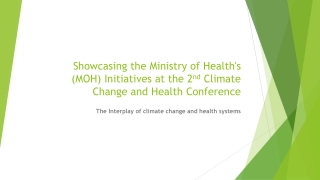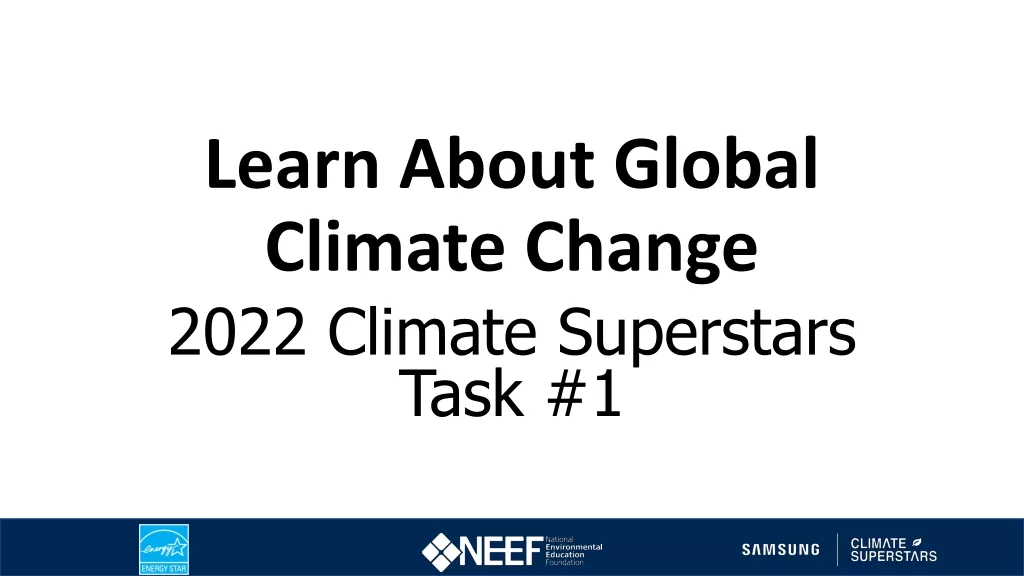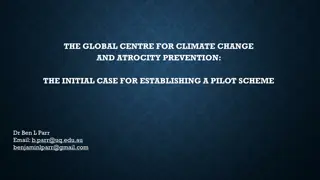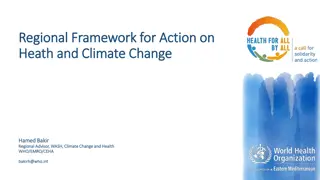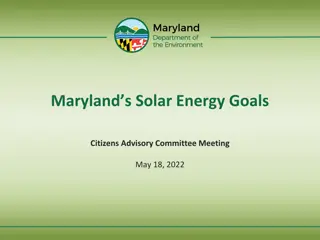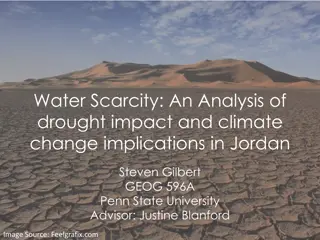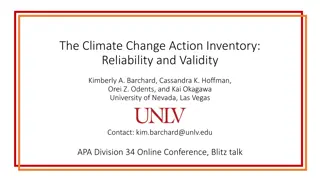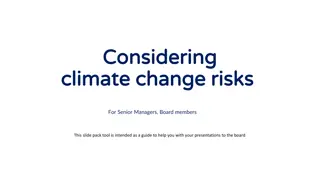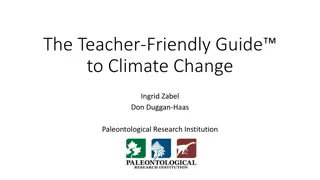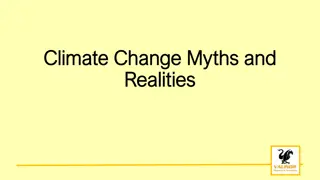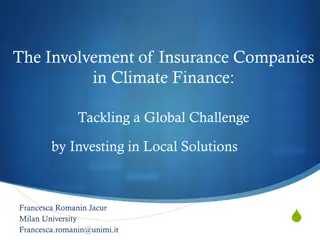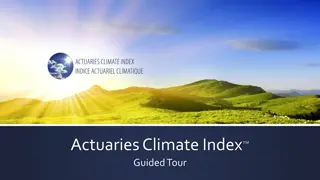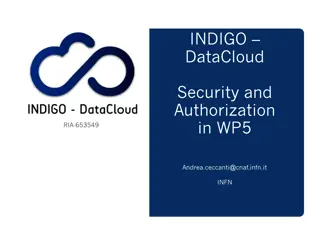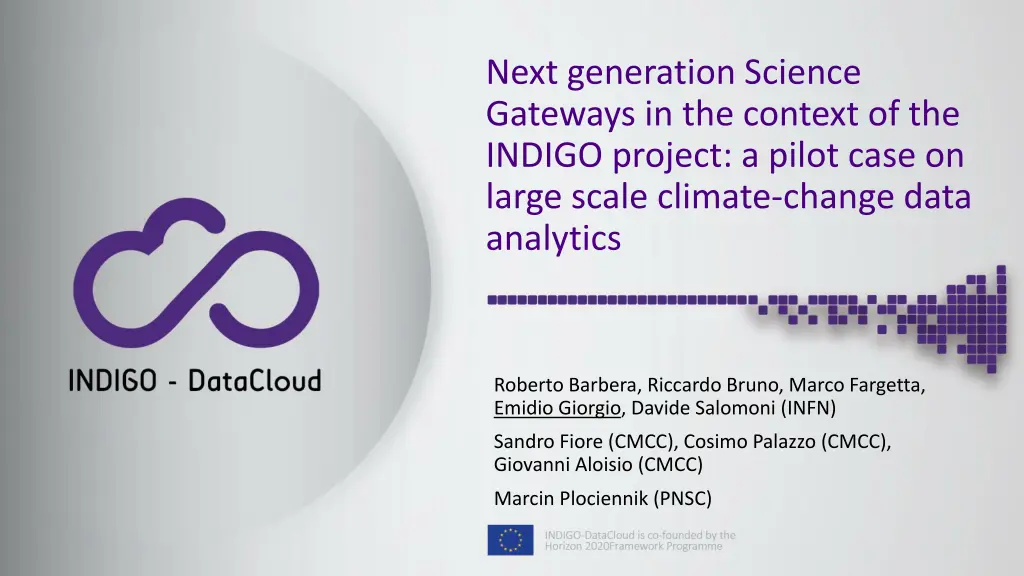
Next-Gen Science Gateways & Climate Data Analytics
Explore the INDIGO project's innovative approach to large-scale climate data analytics, focusing on the development of science gateways and frameworks for future data analysis. Learn about the INDIGO-DataCloud project, work packages, and user communities involved in advancing cloud computing solutions for scientific research. Discover the collaborative efforts to enhance user experiences through web/desktop applications and mobile appliances within the INDIGO platform.
Download Presentation

Please find below an Image/Link to download the presentation.
The content on the website is provided AS IS for your information and personal use only. It may not be sold, licensed, or shared on other websites without obtaining consent from the author. If you encounter any issues during the download, it is possible that the publisher has removed the file from their server.
You are allowed to download the files provided on this website for personal or commercial use, subject to the condition that they are used lawfully. All files are the property of their respective owners.
The content on the website is provided AS IS for your information and personal use only. It may not be sold, licensed, or shared on other websites without obtaining consent from the author.
E N D
Presentation Transcript
Next generation Science Gateways in the context of the INDIGO project: a pilot case on large scale climate-change data analytics Roberto Barbera, Riccardo Bruno, Marco Fargetta, Emidio Giorgio, Davide Salomoni (INFN) Sandro Fiore (CMCC), Cosimo Palazzo (CMCC), Giovanni Aloisio (CMCC) Marcin Plociennik (PNSC)
Overview The INDIGO-DataCloud project INDIGO Work packages Climate Data Analysis Ophidia Catania Science Gateway Framework and FutureGateway Demo Future steps Q&A References
The INDIGO Project INDIGO is a H2020 project aiming at developing a data/compute platform targeting scientific communities Focus on cloud computing uptake, lacking in several scientific areas, especially at PaaS and SaaS level INDIGO will also develop a flexible and modular presentation layer connected to the underlying IaaS and PaaS frameworks innovative user experiences including web/desktop applications and mobile appliances
INDIGO Work Packages User communities (WP2) provide input to technical work packages WP6 responsible for the development of high-level UIs
WP6 Architecture, from a user perspective The Future Gateway Framework (FG) will provide the proper entry point for scientists Workflow solutions (e.g. Kepler) will be adopted to run distributed workflows across multiple sites Workflows will be published on community- based platforms (myExperiment) to address workflows sharing and re-use Ophidia will be exploited as big data analytics framework; The Fabric layer will be represented by test sites with ESGF nodes (e.g. CMCC); Real dataset from the CMIP5 experiment will be used for implementation, test and validation. Interoperability with the ESGF ecosystem will be properly addressed
Climate Data Analysis Case study on Climate model intercomparison data analysis Directly related to the CMIP* experiments CMIP studies output from coupled ocean-atmosphere general circulation models Main Use cases Anomalies analysis, Trend analysis, Climate change signal analysis Ophidia is a big data analytics framework for eScience Primarily used for the analysis of climate data, exploitable in multiple domains Datacube abstraction and OLAP-based approach for big data Support for array-based data analysis and scientific data formats Parallel computing techniques and smart data distribution methods ~100 array-based primitives and ~50 datacube operators i.e.: data sub-setting, data aggregation, array-based transformations, datacube roll-up/drill- down, data cube import, etc.
From Catania SGF to FutureGateway The Catania Science Gateway Framework (CSGF) is a technology, based on Liferay, allowing to create a platform to access distributed computing and data infrastructures through web browsers and mobile devices Main components : AAI module, Grid & Cloud Engine, pluggable portable and modules FutureGateway will be an evolution of CSGF taking into account (also) INDIGO requirements such as the implementation of RESTful APIs for the Engine Interoperability : exposing the FutureGateway Engine API through this REST platform to eliminate Java constraints for the application, facilitating integration of both web portals and applications developed with other technologies Lightweightness : less client/server interactions and bandwidth through JSON usage Security : combination of state of the art security in HTTP/S protocols and support of AAI mechanisms defined by INDIGO
From CSGF to FutureGateway Classic CSGF (before INDIGO) Current (intermediate) approach Web/Mobi le Apps FutureGateway Approach (INDIGO) Web/Mobi le Apps Liferay/Tomcat Liferay/Tomcat Liferay/Glassfish Portlet Portlet Portlet Portlet Portlet Portlet REST APIs REST APIs GridEngine API Server Engine GridEngine API Server JSAGA JSAGA JSAGA Same model of the previous schema The API Server Engine instructs the existing Grid Engine cutting development efforts in re-writing ad hoc JSAGA handlers Comunication Portlet-API Server via REST APIs, this allows to serve external applications The API Server interacts via JAVA libraries to JSAGA Comunication Portlet-GridEngine-JSAGA only possible with JAVA libraries
The demo The goal of this demo is to show the interoperability between already existing scientific software and INDIGO stack, starting from the IaaS/Paas level up to the high-level interface (toolkit, libraries, science gateways, etc.) In the current configuration, users provide input to Ophidia executions via FutureGateway FG submits the user created instance to an Ophidia cluster, and makes the output available when ready There are some limitations, though Restricted set of instances Instances configured statically INDIGO PaaS orchestration services are not yet used Restricted set of models and related parameters (see the demo)
DEMO The actual demo
Future steps Both FutureGateway and Climate Data Analysis use case will evolve : Rather than running a command to the Ophidia cluster, the application will instantiate dynamically a cluster on a private cloud by exploiting the Indigo PaaS FutureGateway will exploit a richer set of features for VM management INDIGO PaaS Orchestrator New data analytics workflow interfaces will enable more complex experiments From single-experiment, single-model to multi-model ensemble experiments Two-level workflows will be implemented to enable geographically distributed experiments on climate data
Questions ? Thanks for your attention ! References INDIGO web site http://www.indigo-datacloud.eu INDIGO SG Portal (based on FutureGateway) https://sgw.indigo-datacloud.eu Ophidia home page http://ophidia.cmcc.it

